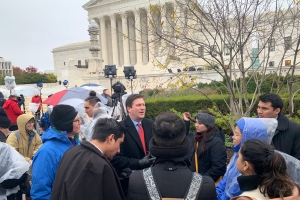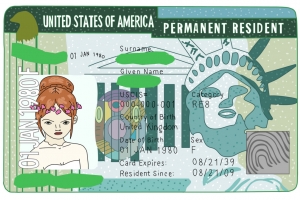Support migrant centric journalism today and donate

Comments by Sanwar Ali:
It seems again that migrants are being treated unfairly. If you do not have the money to pay for lawyers and the local Government will not provide funding then you are already at a disadvantage. Many migrants in immigration court lack English ability. Interestingly, since Donald Trump’s Presidency there has been an increase in funding for migrants who need legal assistance.
Again we take this opportunity to remind those who are thinking of applying for the following non-immigrant work visas L1, H1B, H2B visas and Optional Practical Training visas for F1 students that you apply as soon as possible. It remains uncertain if and when new US visa restrictions will come into place. Even if you do apply soon you could still be caught out by possible new restrictions.
According to a report published by the US Department of Justice inspector general, the Trump administration severely miscalculated budget projections before claiming funding problems that resulted in the replacement of US immigration court interpreters across several states.
Over the last 12 months, in-person US immigration court interpreters have been replaced by recorded videos that explain the court system during an immigrant’s initial appearance before an immigration judge. The Justice Department claims that the switch to recorded videos was ‘necessary to save money.’
However, the Justice Department’s watchdog discovered that officials had based its decision to cut the number of interpreters on faulty information, part of an inaccurate portrayal of the agency’s larger budget situation.
The watchdog’s report states: “The department erroneously estimated its yearly interpreter costs by extrapolating a single, unusually high monthly interpreter expense, which was not supported by invoices or other contemporaneous evidence.”
“This erroneous estimate adversely affected the agency leadership’s communication of accurate budget needs to department and congressional decision makers,” the report said.
Immigrants’ first court appearances
US immigration interpreters are typically present at an immigrant’s first appearance in court, where judges outline the rights of the immigrant, explain how the court process operates and hear from the immigrant themselves for the first time concerning their case.
It’s often the case that those fighting against deportation from the US do not speak English, with some speaking indigenous languages only.
The Justice Department began to replace in-person interpreters with 15 – 20 minute recorded videos in the summer of 2019. The videos are in English and Spanish and they are played to large groups of immigrants appearing in court.
When judges spoke to individual immigrants about their cases, they were asked by the Justice Department to use telephone interpreting services, which many judges have described as ‘inadequate’.
Unfair court process
A number of immigrant advocacy groups argue that in-person interpreter cutbacks make the court process very unfair for immigrants.
The use of videos was initially rolled out across four cities in different states. However, the Justice Department decided against expanding video messaging nationwide.
The department, which is responsible for operating US immigration courts, albeit under heavy control from the attorney general, has often been accused of treating immigrants unfairly.
Under the Trump administration, efforts have been made to overhaul the court system in the name of efficiency and shaping policy. Workpermit.com recently reported that the Justice Department had appointed a number of US immigration judges with a record of turning immigrants away.
Immigrant rights advocates, along with the union that represents immigration judges, claim that many of the moves under Attorney Generals Jeff Sessions and William Barr have ‘jeopardized the fairness of the US immigration court system, making it less efficient’, with interpreter cutbacks being just one example.
Budget miscalculation on costs of Court reporters
According to the inspector general’s report, budget miscalculations can be traced back to the beginning of 2019. At the start of last year, staffers reportedly told the Justice Department that fees for interpreters in the previous month had amounted to $9 million.
However, by the end of 2019, this would mean that the Justice Department would spend $110 million, far exceeding the funding amount the agency had requested from Congress.
In March 2020, the director of US immigration courts sent an email to staff claiming that the calculation represented a budget problem. However, two weeks after the email was sent, Justice Department officials discovered that the estimate was inaccurate.
The Justice Department watchdog said: “Employees could neither explain to us how staff calculated the $9 million nor provide to us invoices or other contemporaneous documentation to support the $9 million figure.”
Meanwhile director of the courts, James McHenry, told the inspector general’s office that he did not update staffers because he’d experienced what he considered a ‘backlash’ after sending the previous emails.
Based on an analysis of invoices issued for interpreting services, the Justice Department actually spent $74.4 million, a figure that is in line with original estimates specified at the beginning of the fiscal year.
According to the watchdog, McHenry had been advised by budget staffers not to send his March email, but he did so anyway to explain his cost-cutting decisions.
The inspector general stated that the agency’s miscalculations were part of wider communication failures concerning court budgets. The watchdog’s report said: “The agency did not accurately predict what it would need from Congress, but operating staffers concluded the department ended up with adequate funding.”
The Justice Department declined to comment on the inspector general’s report. However, the agency told the inspector general’s office “we’re committed to accurate and robust budget management and we agree with the investigator’s recommendations.”
Workpermit.com can help with US employment-based visas
If you would like to apply for a US work visa – including L1 visas, E1 and E2 visas, O1 visas, B1 in lieu of H1B visas and H1B visas - Workpermit.com can help.
Workpermit.com is a specialist visa consultancy with over thirty years of experience dealing with visa applications. We can help with a wide range of visa applications to your country of choice. Contact us for further details. You can also telephone 0344 991 9222.





















